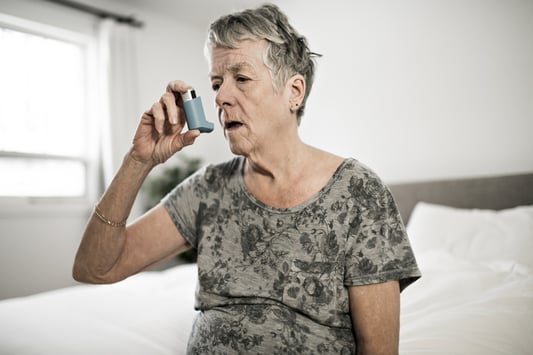
Chronic obstructive pulmonary disease (COPD) is a long-term respiratory condition that affects millions of people worldwide. COPD can cause a range of symptoms, including shortness of breath, coughing, and fatigue. However, with the right treatment and lifestyle changes, people with COPD can lead long and healthy lives.

In this blog, we'll dive into goal setting techniques for people with COPD to help them achieve optimal health outcomes. We will also discuss the value of setting goals and how to do this effectively.
Quit Smoking

Smoking is the leading cause of COPD, and quitting smoking is the most important step in managing the disease. Smoking causes inflammation and damage to the lungs, leading to the development and progression of COPD. Quitting smoking can improve lung function, reduce symptoms, and decrease the risk of exacerbations. Setting a goal to quit smoking is the first step towards a healthier life.
Manage Symptoms
Managing symptoms is an essential part of COPD management. Shortness of breath, coughing, and fatigue can interfere with daily activities and reduce quality of life. Setting goals to manage symptoms can improve quality of life and reduce the risk of exacerbations. This can include:
- Regular exercise to improve lung function and reduce breathlessness
- Using bronchodilators and other medications as prescribed by a doctor
- Practicing breathing techniques such as pursed-lip breathing and diaphragmatic breathing
- Avoiding triggers such as air pollution, dust, and strong odors

Stay Active

Regular physical activity is essential for people with COPD. Exercise can improve lung function, reduce breathlessness, and increase energy levels. Setting goals to stay active can help people with COPD maintain their physical fitness and overall health.
This can include:- Walking or other low-impact exercisesParticipating in pulmonary rehabilitation programs
- Incorporating physical activity into daily routines
- Working with a healthcare provider to develop an exercise plan that's safe and effective
Maintain a Healthy Diet

Maintaining a healthy diet is important for people with COPD. Eating a balanced diet can help manage symptoms and improve overall health. Setting goals to maintain a healthy diet can include:
- Eating a variety of fruits, vegetables, whole grains, and lean proteins
- Avoiding foods that are high in saturated and trans fats, salt, and sugar
- Drinking plenty of fluids to stay hydrated
- Working with a healthcare provider or a registered dietitian to develop a healthy eating plan
Manage Stress

Stress can exacerbate COPD symptoms and reduce quality of life. Setting goals to manage stress can improve overall health and well-being.
This can include:- Practicing relaxation techniques such as meditation, yoga, or deep breathing
- Identifying and avoiding stress triggers
- Seeking support from friends, family, or a healthcare provider
- Engaging in enjoyable activities such as hobbies or socializing
How to be an Effective Goal Setter
Setting goals is an important part of managing COPD and achieving optimal health outcomes. Quitting smoking, managing symptoms, staying active, maintaining a healthy diet, and managing stress are all key objectives for people with COPD who want to lead long and healthy lives.
Working with healthcare providers, including physicians, respiratory therapists, and registered dietitians, can help individuals with COPD develop and achieve their health goals. By taking a proactive approach to COPD management, people can improve their quality of life and live well with this chronic condition.
Setting goals is an essential part of achieving success in any aspect of life. Whether you want to excel in your career, improve your health, or learn a new skill, setting specific, measurable, achievable, relevant, and time-bound (SMART) goals is crucial.

However, setting goals is only half the battle. The real challenge is in working towards them and attaining them. In this section of the blog, we will discuss some practical tips on how to successfully set goals and attain them.
Identify your motivation:
The first step towards setting and achieving your goals is to identify your motivation. What is it that drives you? What do you hope to achieve by accomplishing your goals? Whether it is financial freedom, better health, or personal growth, having a clear understanding of your motivation will help you stay focused and motivated towards your goals.
Set specific and measurable goals:
One of the most critical aspects of setting and attaining goals is to make them specific and measurable. Rather than setting a vague goal like "lose weight," set a specific goal like "lose 10 pounds in the next three months." This will give you a clear target to work towards, and you can measure your progress along the way.
Create a plan:
Once you have set your goals, the next step is to create a plan to achieve them. Break down your goals into smaller, manageable steps and create a timeline for each step. This will help you stay on track and avoid feeling overwhelmed.
Track your progress:
Tracking your progress is essential to staying motivated and on track towards your goals. Use a journal or an app to record your progress and celebrate your accomplishments along the way. This will help you stay motivated and reinforce your commitment to your goals.
Stay accountable:
Accountability is a crucial aspect of setting and achieving goals. Share your goals with someone you trust and ask them to hold you accountable. This could be a friend, family member, or a coach. Having someone to answer to will help you stay committed to your goals.
Stay flexible:
While it is important to stay committed to your goals, it is also essential to stay flexible. Life can be unpredictable, and unexpected challenges may arise. If you encounter a setback, don't give up. Stay flexible and adjust your plan as needed. Remember, setbacks are a natural part of the process, and they can provide valuable learning opportunities.
Setting and attaining goals requires commitment, dedication, and hard work. By following these tips, you can set yourself up for success and achieve your goals. Remember to stay motivated, stay accountable, and stay flexible, and you will be on your way to accomplishing your dreams.
The Life Expectancy of People With COPD

Chronic obstructive pulmonary disease (COPD) is a chronic inflammatory lung disease that causes airflow limitation and breathing difficulties. COPD is one of the leading causes of death worldwide, and it is estimated that over 300 million people suffer from the disease.
The life expectancy of people living with COPD varies depending on the stage of the disease, with more severe stages having a greater impact on life expectancy. In this blog post, we will explore the life expectancies for people living with different stages of COPD.
Stage 1 COPD (Mild)
At stage 1, COPD is typically asymptomatic, and lung function is only slightly impaired. People with stage 1 COPD may not even be aware that they have the disease. The life expectancy for people with stage 1 COPD is close to that of individuals without the disease. According to research, people with stage 1 COPD have a life expectancy of around 14 years.
Stage 2 COPD (Moderate)
At stage 2, COPD symptoms become more noticeable, and lung function is further impaired. People with stage 2 COPD may experience shortness of breath, coughing, and wheezing. The life expectancy for people with stage 2 COPD is lower than for those with stage 1 COPD. Studies suggest that people with stage 2 COPD have a life expectancy of around 12 years.
Stage 3 COPD (Severe)
At stage 3, COPD symptoms become more severe, and daily activities become increasingly difficult. People with stage 3 COPD may experience severe shortness of breath, frequent exacerbations, and difficulty sleeping. The life expectancy for people with stage 3 COPD is significantly lower than for those with earlier stages of the disease. Studies suggest that people with stage 3 COPD have a life expectancy of around 8 years.
Stage 4 COPD (Very Severe)
At stage 4, COPD symptoms are extremely severe, and quality of life is significantly impaired. People with stage 4 COPD may require supplemental oxygen and may experience frequent hospitalizations. The life expectancy for people with stage 4 COPD is significantly lower than for those with earlier stages of the disease. Studies suggest that people with stage 4 COPD have a life expectancy of around 5 years.
So the life expectancy for people living with COPD varies depending on the stage of the disease. People with milder stages of COPD have a life expectancy close to that of individuals without the disease. However, as the disease progresses and symptoms become more severe, life expectancy decreases. Early detection and management of COPD are essential to improving outcomes and increasing life expectancy for people living with the disease. It is essential to work closely with a healthcare professional to develop an effective treatment plan and improve quality of life for people with COPD.
Oxygen Therapy and Life Expectancy

Oxygen therapy can significantly increase life expectancy for people with chronic obstructive pulmonary disease (COPD) by improving their oxygen saturation levels and reducing the strain on their heart and lungs.
Oxygen therapy involves providing supplemental oxygen through a medical device to ensure adequate oxygen levels in the bloodstream. The ARYA Airvito portable oxygen concentrator from LPT Medical is a useful treatment method for those with COPD as it provides a convenient and lightweight solution for patients who require oxygen therapy on the go. With its small size and long battery life, the ARYA Airvito can help COPD patients maintain their oxygen levels and improve their quality of life by allowing them to stay active and independent.
Conclusion

Chronic obstructive pulmonary disease (COPD) is a chronic respiratory disease that can significantly impact a person's quality of life. People with COPD may experience symptoms such as shortness of breath, coughing, and wheezing, which can make it challenging to perform daily activities.
Setting goals can be an effective way for people with COPD to maintain their independence, improve their quality of life, and manage their symptoms. Goals may include exercising regularly, quitting smoking, managing stress, and managing symptoms.
However, life expectancy for people with COPD may be lower than those without the disease, particularly for those who have advanced stages of the disease or have other underlying health conditions. This can make it challenging to set long-term goals, and it may be necessary to adjust goals based on a person's current health status.
Despite the challenges, setting goals and working towards them can have significant benefits for people with COPD, including improved physical and mental health, increased self-esteem, and a greater sense of control over their condition. By working with healthcare professionals to set realistic goals and develop a plan for achieving them, people with COPD can improve their quality of life and live as independently as possible, regardless of their life expectancy.
If you are interested in owning your owning your own ARYA Airvito POC, you can call us at 1-888-416-3855 and talk to an experienced oxygen specialist about your options!


.png)




